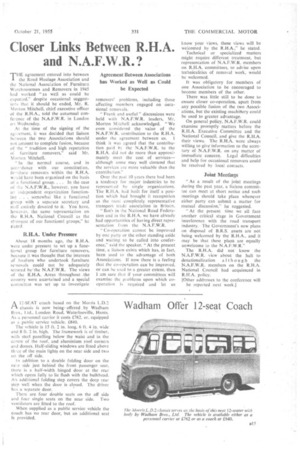Closer Links Between R.H.A.
Page 49

If you've noticed an error in this article please click here to report it so we can fix it.
and N.A.F.W.R.?
T"agreement entered into between the Road Haulage Association and the National Association of .Furniture Warehousemen and Removers in 1945 had worked " as well as could be expeced," despite occasional suggestions that it should be ended, Mr. R. Morton Mitchell, chief executive officer of the .R.H.A., told the autumnal conference of the N.A.F,W.R. in London on Wednesday.
At the time of the signing of the agreement, it was decided that liaison between the two Associations should not amount to complete fusion, because of the " tradition and high reputation of furniture removers," said Mr. Morton Mitchell.
In the normal course, and in accordance with our constitution, In n iture removers within the R.H.A. weuld have been organized on the basis of a functional group.... In the case of the N.A.F.W.R., however, you have an independent organization functioning . . . somewhat like a functional group with a separate secretary and staff entirely devoted to it. You have, however, the same representation on the R.H.A. National Council as the strongest of our functional groups," he stated.
R.H.A. Under Pressure
About 18 months ago, the R.H.A. were under pressure to set up a functional group for furniture removers, because it was thought that the interests of hauliers who undertook furniture removals could not be adequately secured by the N.A.F.W.R. The views of the R.H.A. Areas throughout the country were ascertained and a special committee was set up to investigate
removers' problems, including those affecting members engaged on Occasional removals.
"Frank and useful " discussions were held with IN.A.F.W.R, leaders, Mr. Morton Mitchell acknowledged. "We even considered the value of the N.A.F.W.R. contribution to the R.H.A.
under the agreement between us. I think it was agreed that the contribution paid hy she N.A.F.W.R. to the R.H.A. did not do more than approximately meet the cost of services— although some may well contend that the services are more valuable than the contribution."
Over the past 10 years there had been a tendency for major industries to be represented by single organizations. The R.H.A. had built for itself a position which had brought it recognition as the most completely representative transport trade association in Britain.
"Both in the National Road Federation and in the R.H.A. we have already had opportunities of having direct representation from the N.A.F.W.R.
Co-operation cannot be improved by one party or the other standing aside and waiting to be called into conference," said the speaker. " At the present time, a liaison exists which has, in fact, been used to the advantage of both Associations. If now there is a feeling that the co-operation can be improved, or can be used to a greater extent, then I am sure that if your committees will examine the problems upon which cooperation is required and let us know your views, these views will be welcomed by the R.H.A.," he stated.
Technical or specialized matters might require different treatment, but representation of N.A.F.W.R. members on R.H.A. committees, to advise upon technicalities of removal work, would be welcomed.
It was obligatory for members of one Association to be encouraged to become members of the other.
There was little still to be done to ensure closer co-operation, apart from any possible fusion of the two Associations, but the existing machinery could be used to greater advantage.
On general policy, N.A.F.W.R. could examine promptly matters before the R.H.A. Executive Committee and the National Council, and give the R.H.A. their views. The R.H.A. were always willing to give information to the secretary of N.A.F.W.R. on any matter of immediate concern. Legal difficulties and help for occasional removers could be resolved by local contacts.
Joint Meetings
" As a result of the joint meetings during the past year, a liaison committee can meet at short notice and such meetings should take place whenever either party can submit a matter for mutual discussion," he suggested.
"At the present time we all face another critical stage in Government interference with the road transport industry.The Government's new plans on disposal of B.R.S. assets are not being welcomed by the R.H.A., and it may be that these plans are equally unwelcome to the N.A.F.W.R."
The R.H.A. did not know the N.A.F.W.R. view about the halt to denationalization although the N.A.F.W.R. members on the R.H.A. National Council had acquiesced in R.H.A. -policy.
[Other addresses to the conference will be reported next week.]




































































































